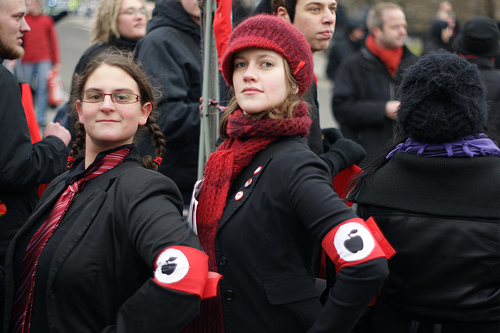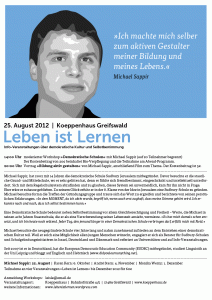Moriel Rothman, activist par excellence, poet, and blogger – whom I was glad to get to know during my last visit to Jerusalem – wrote a post much like one I’ve often considered writing:
[…]
I do not have a positive vision as to what should be here, in terms of political “solutions,” arrangements, et cetera. I do, however, have a very strong sense of what should not be here (for a more detailed list, see: Rothman, Blog About Things That He Thinks Should Not Be, Everyday, All Pages, www.thelefternwall.com). Here’s a metaphor I made up for this friend: let’s say Israel is a garden. There are some people who will try and plant flowers of solutions, of development, of progress here in this garden, and I think that is a good thing and I support them. However, I see my role not as planting flowers, but rather as weeding, weeding out violence, weeding out racism, weeding out oppression, weeding out hatred, et cetera. The weeds here have grown quite powerful, and probably by the fault of no single gardener or even group of gardeners but rather by the breezes, rainfalls, insects and chemicals of history and political circumstance. Someone needs to take them out so that there will be room for others to plant the flowers. If you try to plant a flower of “solution” in a garden overrun with weeds of violence or racism, the flower won’t have much of a chance to grow.
[…]
I can only imagine good coming out of my articulating for readers what it is I love about living here, whether to complicate the picture for those who are overly-excited about Palestine/Palestinians (if you will notice, I don’t often write positive things about Palestine/Palestinians either, and I am not a Palestinian Nationalist, even as I support Palestinians’ right to live in freedom, like everyone else), or to clarify for readers who find my work too critical that I truly do what I do out of love and concern, and a desire to build and improve, even if I think that building needs to come from weeding dangerous phenomena (phenomena, and never people […])
[…]
I will indeed make a list of things I really like. Which is fun for me too.
1. The people. In general I really like Israeli people, even if I disagree with many of them re: politics/Palestine. I like their directness, I like their humor, I like their warmth, I like the diversity of history and of journey and of identity and of belief, I like the way we all share a sort of nutsness, especially Jerusalemites.
Read the rest over at Moriel’s blog, The Leftern Wall »
I love the garden metaphor, and I also love most of the things on Moriel’s list. Many of them really capture why I miss Israel and care so much about what goes on there. This post, like many on Moriel’s blog, is well worth reading.
Meta note: the lack of posts lately was mainly because of some drama I had, which I won’t get into here. The important thing is that everything’s fine now, even better than fine, and once I’ve finished catching up on some things, I expect to be posting again, for real.






![[Video] Sudbury Jerusalem promo, now with English subtitles!](https://www.didyoulearnanything.net/wp-content/uploads/011.jpg)
![[Video] Sudbury Jerusalem promo, now with English subtitles!](http://www.didyoulearnanything.net/wp-content/uploads/011-300x225.jpg)



